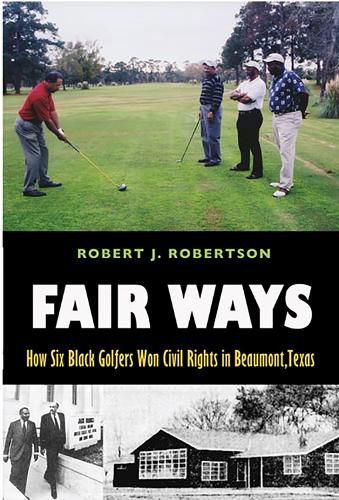Readings Newsletter
Become a Readings Member to make your shopping experience even easier.
Sign in or sign up for free!
You’re not far away from qualifying for FREE standard shipping within Australia
You’ve qualified for FREE standard shipping within Australia
The cart is loading…






This title is printed to order. This book may have been self-published. If so, we cannot guarantee the quality of the content. In the main most books will have gone through the editing process however some may not. We therefore suggest that you be aware of this before ordering this book. If in doubt check either the author or publisher’s details as we are unable to accept any returns unless they are faulty. Please contact us if you have any questions.
In the summer of 1955, early in the modern civil rights era, six African American golfers in Beaumont, Texas, began attacking the Jim Crow caste system when they filed a federal lawsuit for the right to play the municipal golf course. The golfers and their African American lawyers went to federal court and asked a conservative white Republican judge to render a decision that would not only integrate the local golf course but also set precedent for desegregation of other public facilities, as well.In Fair Ways, Beaumont native Robert J. Robertson chronicles three parallel stories that converged in this important case. He tells the story of the plaintiffs-avid golfers who had learned the game while working as caddies and waiters-and their young lawyers, recent graduates from Howard University law school, and the Republican judge just appointed to the bench by President Eisenhower. Would the judge apply the new principles of Brown v. Board of Education to the questions before him? Would he use federal judicial power to override state laws and outlaw local customs?Fair Ways gives an uncommonly vivid picture of racial segregation and the forces that brought about its end. Using public case papers, public records, newspapers, and oral histories, Robertson has recreated the scene in Beaumont on the eve of desegregation, describing in detail the parallel white and black communities that characterized the Jim Crow caste system. Through this account, the forces at work in the South-education, military experience, rising expectations, the NAACP, and the rule of law-are personified dramatically by the golfers, the lawyers, and the judge.
$9.00 standard shipping within Australia
FREE standard shipping within Australia for orders over $100.00
Express & International shipping calculated at checkout
This title is printed to order. This book may have been self-published. If so, we cannot guarantee the quality of the content. In the main most books will have gone through the editing process however some may not. We therefore suggest that you be aware of this before ordering this book. If in doubt check either the author or publisher’s details as we are unable to accept any returns unless they are faulty. Please contact us if you have any questions.
In the summer of 1955, early in the modern civil rights era, six African American golfers in Beaumont, Texas, began attacking the Jim Crow caste system when they filed a federal lawsuit for the right to play the municipal golf course. The golfers and their African American lawyers went to federal court and asked a conservative white Republican judge to render a decision that would not only integrate the local golf course but also set precedent for desegregation of other public facilities, as well.In Fair Ways, Beaumont native Robert J. Robertson chronicles three parallel stories that converged in this important case. He tells the story of the plaintiffs-avid golfers who had learned the game while working as caddies and waiters-and their young lawyers, recent graduates from Howard University law school, and the Republican judge just appointed to the bench by President Eisenhower. Would the judge apply the new principles of Brown v. Board of Education to the questions before him? Would he use federal judicial power to override state laws and outlaw local customs?Fair Ways gives an uncommonly vivid picture of racial segregation and the forces that brought about its end. Using public case papers, public records, newspapers, and oral histories, Robertson has recreated the scene in Beaumont on the eve of desegregation, describing in detail the parallel white and black communities that characterized the Jim Crow caste system. Through this account, the forces at work in the South-education, military experience, rising expectations, the NAACP, and the rule of law-are personified dramatically by the golfers, the lawyers, and the judge.